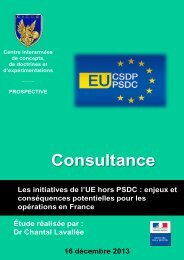Conference
science-research-bulletin-2013-conference
science-research-bulletin-2013-conference
Create successful ePaper yourself
Turn your PDF publications into a flip-book with our unique Google optimized e-Paper software.
EUROPEAN POLICE SCIENCE AND RESEARCH BULLETIN<br />
SPECIAL CONFERENCE EDITION<br />
TRUST IN THE GERMAN POLICE<br />
Mai Sato ( 1 )<br />
United Kingdom<br />
Rita Haverkamp ( 2 )<br />
Germany<br />
Mike Hough<br />
United Kingdom<br />
Keywords: Ethnic minorities, European Social Survey, police, rule adherence, procedural justice, trust<br />
Abstract: The relative levels of trust in the police are explored, using data from the fifth round of the<br />
European Social Survey (ESS) which covered mainly 28 European countries. In this article, the position<br />
of Germany is examined within the international context. German trust in the police, for both German<br />
natives and ethnic minorities, for those 15 and over is high in comparison to other European countries.<br />
The article also tests if it is the fair treatment of citizens by the police, or the high value placed on rule<br />
adherence and conformity, that is driving the German citizen’s trust. It shows that the German police<br />
is trusted due to their perceived fairness, effectiveness and shared moral values, rather than on value<br />
placed on conformity to authority.<br />
INTRODUCTION<br />
The 1960s through to the 1980s was a<br />
challenging period for the German police, as<br />
they were faced with the tasks of managing<br />
public disorders, riots, left-wing extremist<br />
terrorism, and environmental demonstrations,<br />
their handling of which tainted their positive<br />
image (Cao 2001: 170). In 1995, Amnesty<br />
International published a report damaging<br />
for the German police concerning their use<br />
of excessive force in restraining or arresting<br />
citizens, and the ill treatment of detainees in<br />
police custody (Amnesty International 1995).<br />
The report also argued that the ill treatment<br />
appeared to be racially motivated, many of<br />
those targeted being foreign nationals including<br />
refugees, asylum seekers and people from ethnic<br />
minority backgrounds (Ibid.).<br />
More recent studies of the German police,<br />
mainly focusing on adolescents, however, depict<br />
a ‘bürgernahe (citizen friendly)’ security force.<br />
In a comparative study between German and<br />
French adolescents, the preliminary analysis<br />
showed that the degree of positive experience<br />
with, and perception of, the police was much<br />
higher in Germany than in France (Oberwittler<br />
& Roché 2013). Whilst in France African and<br />
Turkish migrants have particularly low opinions<br />
of the police in comparison to native French<br />
adolescents, the German data show very little or<br />
no difference between the amount of contact,<br />
the quality of contact, and general perceptions<br />
of the police between Turkish migrants and<br />
native Germans adolescents (Ibid.) Other studies<br />
of German adolescents also paint a similar<br />
picture with small or no ethnic difference in the<br />
levels of trust in the police (e.g. Heitmeyer et al.,<br />
2010; Baier et al., 2010). Studies exploring the<br />
everyday relationship between migrants and the<br />
police such as Hüttermann’s qualitative analysis<br />
(2000) and Gesemann‘s (2003) survey showed<br />
that while migrants tend to be less accepting of<br />
the police in comparison to native Germans, the<br />
police also manage to establish informal styles of<br />
interaction with migrants, thus being accepted<br />
‘on the street’ within the community.<br />
In a project titled ‘Police in conflict with ethnic<br />
minorities and social marginalised groups’,<br />
( 1 ) Corresponding author<br />
( 2 ) Corresponding author<br />
83





